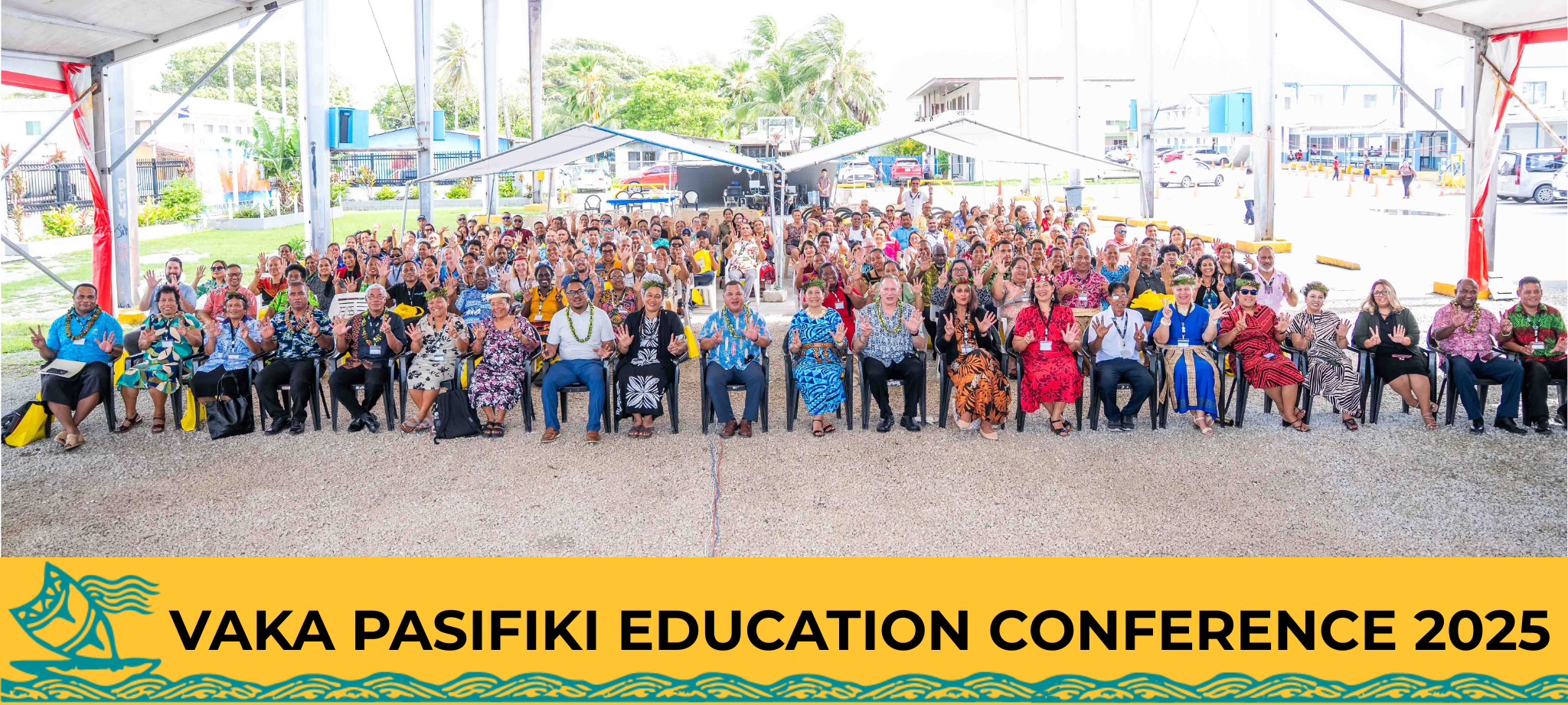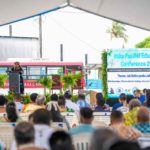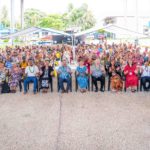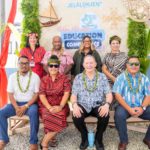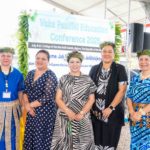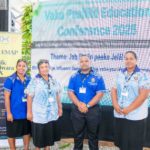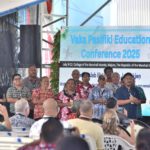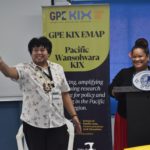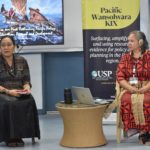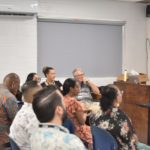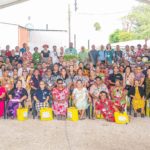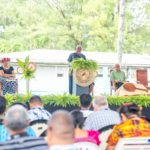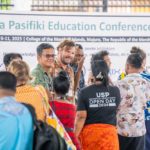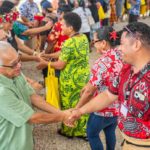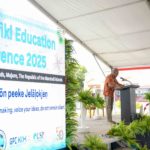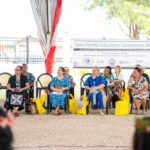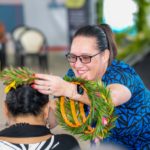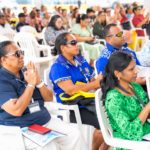Event Highlights: Vaka Pasifiki Education Conference 2025
Note: This event highlights report was authored by the KIX EMAP Pacific Team and the VPEC organisers.
Date: July 9-11, 2025 | Location: Republic of the Marshall Islands – Majuro
Historic Significance
The 2025 Vaka Pasifiki Education Conference marked a historic milestone as the first conference hosted in the Northern Pacific, celebrating 25 years of the Re-thinking Pacific Education Initiative (RPEI) and 50 years of service by the Institute of Education, USP. The conference brought together 154 presenters and collaborators from 15 countries and territories for 52 presentations across 40 concurrent sessions for 260+ participants from across the Pacific.
The Institute of Education (IoE), University of the South Pacific would like to acknowledge their organising partners for Vaka Pasifiki 2025:
- Marshall Islands Public School System
- College of the Marshall Islands
- GPE KIX EMAP HUB (Knowledge Innovation Exchange)
- University of the South Pacific – Marshall Islands Campus
Conference Theme and Vision
“Jab liktōn peeke jelalokeṇ: With knowledge, influence decision-making, voice your ideas, do not remain silent”
This powerful Marshallese theme dedicated the conference to Micronesian teachers and emphasised Pacific educators’ collective voice in shaping educational decision-making across the region.
Hear from conference participants:
Opening Keynote: Presidential Vision for Integrated Education
Delivered on Behalf of Her Excellency, President Dr. Hilda C. Heine
The conference opened with a groundbreaking keynote emphasising the interconnection between health and education. Key highlights included:
Health-Education Integration
The keynote reinforced that “Healthy students learn better. Educated communities make healthier decisions,” calling for ministries to work across sectors to address challenges from noncommunicable diseases to climate change.
Holistic Educational Vision
The address advocated for comprehensive reimagining of Pacific education to include:
- School-based health programmes and mental health awareness
- Reproductive health education and ocean literacy
- Climate resilience integrated into curricula
- Classrooms as “places that promote well-being, dignity, and hope”
Regional Alignment
Positioned within Pacific 2050 vision for a Blue Pacific Continent, the keynote connected education as “a tool of empowerment, and health as a foundation for resilience.”
Conference Structure and Impact
Session Distribution (by theme):
- 30% Quality Education – Curriculum, Pedagogy & Assessment
- 18% Teacher Education & Professional Development
- 12% Language preservation and multilingual education
- 12% Policy, Scholarship & Publication
- 10% Social Justice, Equity, Inclusion & Community Engagement
Session Formats:
- Individual/Joint Presentations: 30-minute focused discussions
- Interactive Panels: Talanoa/Bwebwenato/Tok Stori sessions (90 minutes)
- Workshops: Practical, hands-on learning (90 minutes)
- Teacher Exchange: Knowledge sharing dialogue (60 minutes)
Key Session Highlights
Decolonising Education and Indigenous Knowledge
- “Decolonising Positionality, Articulating Our Voices and Grounding Critical Pacific Islands and Oceania Studies Based Pedagogy”
- “Indigenous Knowledge: Does it Have a Place in the Mathematics and Science Classroom?”
- “Integrating Pedagogies from No’o ‘Anga”
Teacher Professional Development
- Multiple Teacher Exchange sessions covering student-centred learning, classroom management, technology integration, and culturally responsive teaching
- “The Fundamentals of Culturally Responsive Pedagogies”
- “Bridging the Gap: A Multifaceted Approach to Reforming Teacher Education for Inclusive Practices”
Pacific Languages and Identity
- “The Pacific Identity of Nauru Through Voices, Voicing, and Silencing”
- “Voices of the Va: ReStorying Pasifika Languages as Sacred Ground for Learning, Belonging, and Identity Formation”
- “Bilingual Resources by Teachers for Teachers: Writing our Own in Kiribati and I-Kiribati”
Climate and Resilience Education
- “Contesting Nuclear Colonialism Through Education”
- “Resilience Education Research”
- Multiple sessions integrating climate change into educational frameworks
Closing Keynote: The Vaka as Symbol of Unity
Delivered by Hon. Gerald M. Zackios, Minister of Education, Sports and Training, RMI
The closing address powerfully employed the vaka metaphor—not merely as a canoe, but as a symbol of Pacific resilience, innovation, and collective navigation through challenges. Key themes included:
Institutional Resilience
Celebrated the Institute of Education’s 50-year journey as testament to educational continuity in a region where “political, economic, and social tides constantly shift.”
Collective Action
Issued a call for sustained action, urging participants to carry conference momentum back to their contexts—“paddling in the same direction” while recognizing that “the collective vaka of Pacific education is strong.”
Regional Impact
Acknowledged the conference’s broader significance in advancing the Pacific Education Research Framework (PERF) initiatives and representing the largest gathering of Pacific educators in the North Pacific region.
Vote of Thanks and Future Vision
Associate Professor Frances C. Koya Vaka’uta, Team Leader Culture for Development, Pacific Community
Dr. Vaka’uta’s comprehensive closing remarks outlined the future of Vaka Pasifiki:
What Makes Vaka Pasifiki Special
“What makes Vaka Pasifiki is the people—the mana, the enthusiasm, the energy that we each bring into this space when we gather, collaborate and commune is exponential—finding root across our beautiful region and growing and blossoming into many branches of movers, and thinkers, teachers and researchers, scholars and change makers.”
Future Direction
- Triennial Conference Cycle: Moving across sub-regional cycles through Micronesia, Polynesia, and Melanesia
- Next Conference: July 2028, Rarotonga, Cook Islands
- Traditional Paddle Ceremony: Commissioner Nimmer handed the Vaka Pasifiki Paddle to Dr. Seu’ula Johansson-Fua
Call to Action
“Let us carry forward the momentum we have built here and take with us the wisdom of the beautiful theme that RMI has gifted us: WITH KNOWLEDGE, INFLUENCE DECISION MAKING, VOICE YOUR IDEAS, DO NOT REMAIN SILENT.“
Conclusion: Charting the Future
The 2025 Vaka Pasifiki Education Conference in the Marshall Islands established a new benchmark for Pacific educational collaboration. By bringing together educators from Melanesia, Polynesia, and Micronesia in unprecedented unity, the conference demonstrated that when Pacific peoples unite with shared purpose, they can navigate any challenge and chart a course toward a more equitable and culturally grounded educational future.
The conference’s dedication to Micronesian teachers, its integration of health and education perspectives, and its emphasis on indigenous knowledge systems created a transformative space where Pacific educators found their collective voice and prepared to influence educational decision-making across the region.
As the traditional paddle was passed to the Cook Islands for 2028, the conference affirmed that the vaka of Pacific education continues to sail strong, guided by cultural values, powered by collective wisdom, and directed toward a future where Pacific peoples control their own educational destinies.
Conference Legacy and Continuation
Historical Context
The Vaka Pasifiki Education Conference series has grown from its origins in 2001 with 19 people to become the premier Pacific education gathering:
- 2014: Tonga (350+ attendees)
- 2016: Solomon Islands (600 attendees)
- 2018: Fiji (300 attendees)
- 2021: Tonga/Samoa (300 attendees)
- 2025: Marshall Islands (260+ attendees)
Strategic Framework
Operating under the Pacific Education Research Framework Board (PERF), the initiative encompasses:
- Leadership development
- Research and publications
- Pacific Association of Teacher Educators (PATE)
- Development programs supporting Pacific education systems
- Network of Pacific Educators (NOPE)

